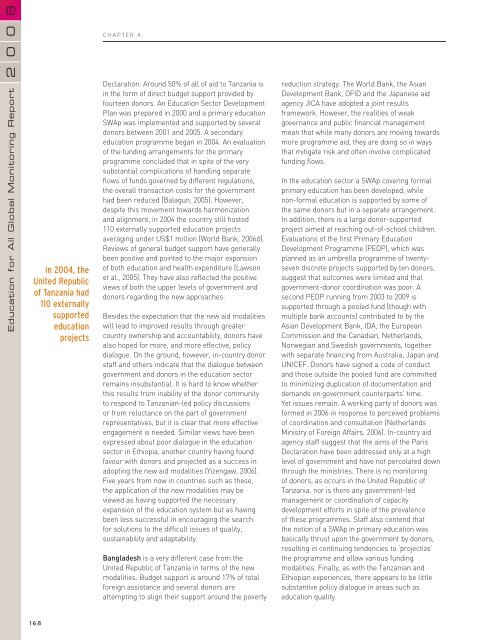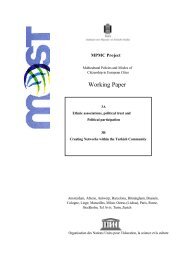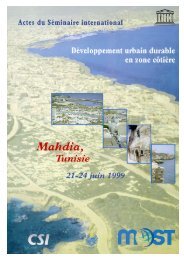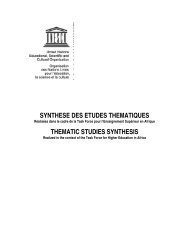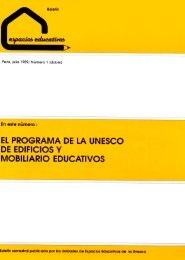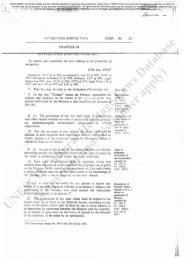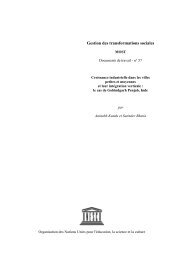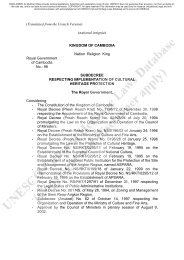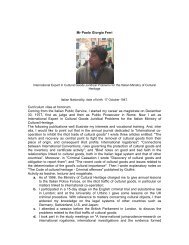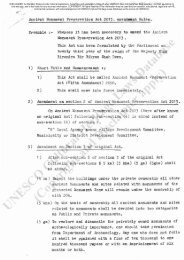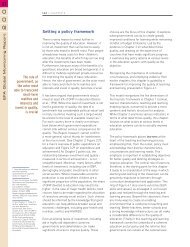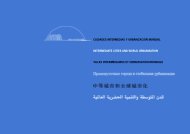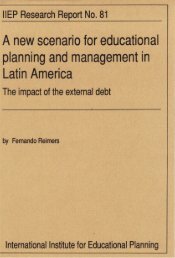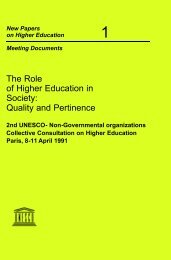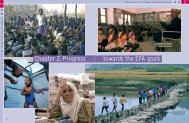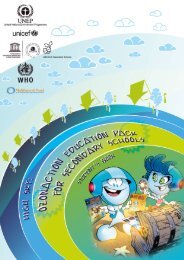Financing Education / pdf - Unesco
Financing Education / pdf - Unesco
Financing Education / pdf - Unesco
Create successful ePaper yourself
Turn your PDF publications into a flip-book with our unique Google optimized e-Paper software.
2<br />
0<br />
<strong>Education</strong> for All Global Monitoring Report<br />
0<br />
8<br />
CHAPTER 4<br />
In 2004, the<br />
United Republic<br />
of Tanzania had<br />
110 externally<br />
supported<br />
education<br />
projects<br />
Declaration. Around 50% of all of aid to Tanzania is<br />
in the form of direct budget support provided by<br />
fourteen donors. An <strong>Education</strong> Sector Development<br />
Plan was prepared in 2000 and a primary education<br />
SWAp was implemented and supported by several<br />
donors between 2001 and 2005. A secondary<br />
education programme began in 2004. An evaluation<br />
of the funding arrangements for the primary<br />
programme concluded that in spite of the very<br />
substantial complications of handling separate<br />
flows of funds governed by different regulations,<br />
the overall transaction costs for the government<br />
had been reduced (Balagun, 2005). However,<br />
despite this movement towards harmonization<br />
and alignment, in 2004 the country still hosted<br />
110 externally supported education projects<br />
averaging under US$1 million (World Bank, 2006b).<br />
Reviews of general budget support have generally<br />
been positive and pointed to the major expansion<br />
of both education and health expenditure (Lawson<br />
et al., 2005). They have also reflected the positive<br />
views of both the upper levels of government and<br />
donors regarding the new approaches.<br />
Besides the expectation that the new aid modalities<br />
will lead to improved results through greater<br />
country ownership and accountability, donors have<br />
also hoped for more, and more effective, policy<br />
dialogue. On the ground, however, in-country donor<br />
staff and others indicate that the dialogue between<br />
government and donors in the education sector<br />
remains insubstantial. It is hard to know whether<br />
this results from inability of the donor community<br />
to respond to Tanzanian-led policy discussions<br />
or from reluctance on the part of government<br />
representatives, but it is clear that more effective<br />
engagement is needed. Similar views have been<br />
expressed about poor dialogue in the education<br />
sector in Ethiopia, another country having found<br />
favour with donors and projected as a success in<br />
adopting the new aid modalities (Yizengaw, 2006).<br />
Five years from now in countries such as these,<br />
the application of the new modalities may be<br />
viewed as having supported the necessary<br />
expansion of the education system but as having<br />
been less successful in encouraging the search<br />
for solutions to the difficult issues of quality,<br />
sustainability and adaptability.<br />
Bangladesh is a very different case from the<br />
United Republic of Tanzania in terms of the new<br />
modalities. Budget support is around 17% of total<br />
foreign assistance and several donors are<br />
attempting to align their support around the poverty<br />
reduction strategy. The World Bank, the Asian<br />
Development Bank, DFID and the Japanese aid<br />
agency JICA have adopted a joint results<br />
framework. However, the realities of weak<br />
governance and public financial management<br />
mean that while many donors are moving towards<br />
more programme aid, they are doing so in ways<br />
that mitigate risk and often involve complicated<br />
funding flows.<br />
In the education sector a SWAp covering formal<br />
primary education has been developed, while<br />
non-formal education is supported by some of<br />
the same donors but in a separate arrangement.<br />
In addition, there is a large donor-supported<br />
project aimed at reaching out-of-school children.<br />
Evaluations of the first Primary <strong>Education</strong><br />
Development Programme (PEDP), which was<br />
planned as an umbrella programme of twentyseven<br />
discrete projects supported by ten donors,<br />
suggest that outcomes were limited and that<br />
government-donor coordination was poor. A<br />
second PEDP running from 2003 to 2009 is<br />
supported through a pooled fund (though with<br />
multiple bank accounts) contributed to by the<br />
Asian Development Bank, IDA, the European<br />
Commission and the Canadian, Netherlands,<br />
Norwegian and Swedish governments, together<br />
with separate financing from Australia, Japan and<br />
UNICEF. Donors have signed a code of conduct<br />
and those outside the pooled fund are committed<br />
to minimizing duplication of documentation and<br />
demands on government counterparts’ time.<br />
Yet issues remain. A working party of donors was<br />
formed in 2006 in response to perceived problems<br />
of coordination and consultation (Netherlands<br />
Ministry of Foreign Affairs, 2006). In-country aid<br />
agency staff suggest that the aims of the Paris<br />
Declaration have been addressed only at a high<br />
level of government and have not percolated down<br />
through the ministries. There is no monitoring<br />
of donors, as occurs in the United Republic of<br />
Tanzania, nor is there any government-led<br />
management or coordination of capacity<br />
development efforts in spite of the prevalence<br />
of these programmes. Staff also contend that<br />
the notion of a SWAp in primary education was<br />
basically thrust upon the government by donors,<br />
resulting in continuing tendencies to ‘projectize’<br />
the programme and allow various funding<br />
modalities. Finally, as with the Tanzanian and<br />
Ethiopian experiences, there appears to be little<br />
substantive policy dialogue in areas such as<br />
education quality.<br />
168


